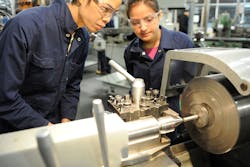Refocusing on Manufacturing’s Future, for Long-Term Gain
Manufacturing projects demand focus — focus on designs, on materials, on systems and set-ups, and skills. Manufacturing businesses need focus, too, on customers, on competitors, and on market trends. The U.S. manufacturing industry is undeniably successful and critical, but is it so focused on immediate objectives that it isn’t looking at the long term.
A “long-term plan” is what every business and every investor professes to want: a reliable, sustainable strategy that will withstand any challenge the market delivers. We seem to have gotten away from long-term planning. The long game doesn’t deliver its rewards quickly enough. Too many businesses look for short-term profits, instantaneous payback. One unfortunate consequence of the short-term thinking was the near-elimination of manufacturing apprenticeship programs, however with a new focus and acceptance these can become prevalent once again.
Such programs remain common in countries like Germany and Switzerland, and contribute to their robust manufacturing economies. There is much to be learned from this component of the culture in these countries. In contrast, our preference for short-term rewards has influenced our training and education systems, and even our culture. Shop classes were phased out of high schools and technical colleges. Decades past analysts announced our transformation into a service-based economy. Today our nation’s manufacturing economy is the world’s eighth largest, when compared to other country’s entire economic footprint.
We need to pivot back to a long-term approach, to regain a sustainable strategy that will support younger citizens. We need long-term planning because manufacturing must always have a place in the United States. It creates wealth and sustains middle-class life. It is essential for the stability, defense and welfare of our population. After all, "Manufacturing Create$," a term that I coined to emphasize the importance of manufacturing’s role in our culture.
I contend that we must get back to basics, in financial planning, in business, and in workforce training. Let’s go all the way back to parenting our children more according to the long-term model. It is ok for your child to learn failure, to learn disappointment. Without these lessons he or she cannot appreciate success, winning, joy and pride. What does this have to do with manufacturing and the economy and the workforce? Everything!
We need to properly and aggressively mentor young people. They need to respect and appreciate their mentors, and the opportunity to learn through mentoring. We owe it to our youth to give them our best efforts and experiences, and as a result they will be their best. Young people who respond to this approach will thrive. They will show up to work early and stay late eager to learn from their mentors. While there is no short-term reward for eagerness, they will grow to understand the long-term value of it. This has been missing for some in the recent generations.
Manufacturing is experiencing an economic revival. Harry Moser’s Reshoring Initiative has inspired a real and important trend. Businesses today are emphasizing total cost of ownership and want to produce and source their products domestically. However, for this to continue businesses need workers, skilled workers who show up reliably, alert and prepared, and drug free. At the moment, this is no sure thing, but if we recommit to the long game we have the chance to change things for the better.
Technical programs and shops are returning to both high school and technical college curriculums. Young people perhaps are more receptive to mentoring, and programs like Project Lead the Way, PRIME, STEM, and others are viewed as positive programs. Apprenticeships and internships give young people the means to enter into the manufacturing pathway. Every October for Manufacturing Day manufacturers open their doors in order to introduce both parents and students alike to a world they rarely knew existed. One that is exciting and full of opportunity.
I founded CHAMPION Now!, a 501(C)(3) organization. The name is an acronym for “Change How American Manufacturing’s Perceived In Our Nation.” The Now is the call to action. I recently released my book, Finding America’s Greatest Champion: Building Prosperity through Manufacturing, Mentoring, and the Awesome Responsibility of Parenting. I interviewed over 40 people — elite athletes, executives, parents, clergy, media personalities, and leaders in manufacturing, education and politics — to collect their insights on vital topics such as mentorship, parenting, and the importance of manufacturing greatness in the United States.
The importance of this subject goes beyond manufacturing: by becoming better mentors and parents, we will re-discover the basic understanding and resources to help narrow the manufacturing skills gap, as well as ease the mounting student debt crisis.
There is long-term value for all of us. Everyone should consider that it is both cool and honorable to work with your minds and your hands. It’s both prudent and fiscally sound to leave school without debt that will stifle your future, and we should want that for all young people. Reconsider what is possible and encourage young people to view the future differently by shifting your focus. Get back to planning for the long game. I think the results will be positive and long lasting for generations to come. We all are Finding America’s Greatest Champion!
Terry M. Iverson is President/CEO of Iverson & Company, a machine tool distributorship and rebuilder in Des Plaines, Ill.
About the Author
Terry Iverson
President/CEO
Terry M. Iverson is President/CEO of Iverson & Company, a machine tool distributorship and rebuilder in Des Plaines, Illinois, and the author of "Finding America’s Greatest Champion: Building Prosperity through Manufacturing, Mentoring and the Awesome Responsibility of Parenting."
